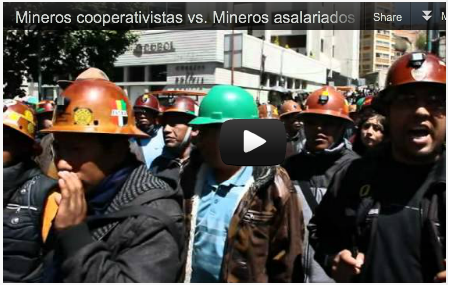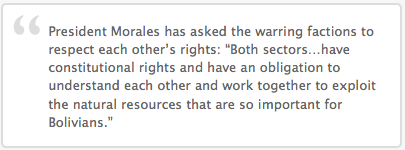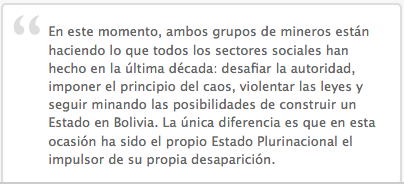
Video is in original article. Click picture to go there. Video is embedded in article.
Bolivia: Miners' Dispute Holds La Paz Under Siege
September 14, 2012 - Global Voices Online
Written by Pablo Andres Rivero
Hundreds of miners from private cooperatives are continuing to block the main access roads to La Paz, Bolivia's seat of Government.
The siege was sparked by a dispute between private cooperative miners from the La Paz Departmental Federation of Mining Cooperatives (Fedecomin in Spanish) and employed miners from the state-run Bolivian Mining Corporation (Comibol in Spanish). Both rival groups are seeking to take control of the zinc and tin Colquiri mine, nationalised from Glencore International by Bolivia's government in June 2012.
The issue arises from Supreme Decree 1337, signed by President Evo Morales, which guarantees the control of operating activities in the northern part of the mine Colquiri, more precisely the Rosario vein.
The conflict began on the ground after the delimitation of operation areas: Colquiri unionised miners, who are meant to operate in the south, refuse to give the cooperative miners participation. Moreover, unionised miners are blocking the access to the Colquiri mine, 92 miles (149 kilometers) from La Paz.
The government had set up negotiation talks between the rival factions, and it was agreed that the siege would be lifted during the evening of Wednesday, September 12; however, the blockades remain and the miners have issued further threats.
Private cooperative miners have been close allies of the government led by left-wing President Evo Morales. This group has declared that the unionised miners, who are also members of the Bolivian Workers' Center (COB in Spanish), are 'irreconcilable enemies'.
The blog Videourgente ("urgent video") posts a video showing demonstrations by unionised miners in La Paz:
According to the Americas Quarterly blog:

However, Eduardo Bowles states in his blog that both miners' groups are corroding the mining industry and affecting the State's interests:

At this point, both groups of miners are doing what all social movements have done in the last decade: defying authority, imposing the principle of chaos, violating the laws and continuing to undermine the possibilities of building a State in Bolivia. The only difference is that this time the Plurinational State itself has been the driver of its own demise.